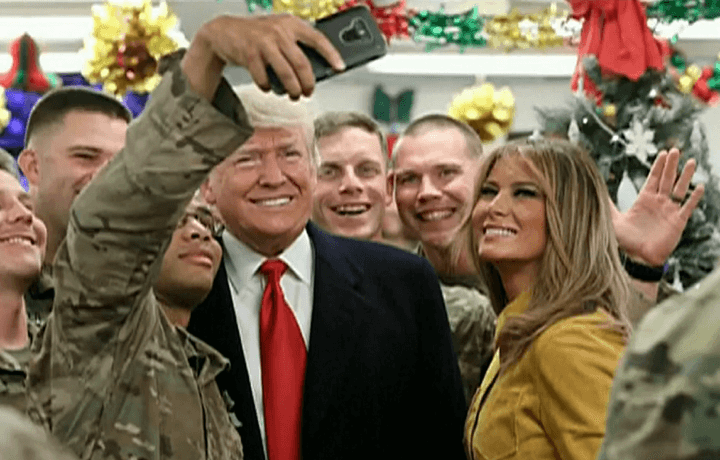Arguments over the politicization of the military—real or imagined—are nothing new. But listening to the current debate, one would think it is a peculiar invention of the current administration.
The impetus for the latest outbreak of hand-wringing is the White House visit to Japan around Memorial Day. In a story that evoked the December story of airmen in Germany who carried “Make America Great Again” hats for the president to sign, naval aviators were photographed with custom “morale patches” bearing President Trump’s likeness and the phrase “Make Aircrew Great Again.”
Forgive me for not getting worked-up over sailors wearing a patch that honors their commander in chief’s slogan, even if it is political.
But “Patchgate” was just a short-lived preview of the more enduring story, the White House direction to keep the USS John S. McCain “out of sight,” presumably to avoid provoking the president’s ire. It’s no secret, after all, that Trump is no fan of the late senator and Navy veteran.
The Navy’s chief of information (equivalent to the Army and Air Force chiefs of public affairs) acknowledged the request. A “request was made to the U.S. Navy to minimize the visibility of USS John S. McCain,” Rear Adm. Charlie Brown, said. He then pushed back on other aspects of the story, insisting that the Navy did not acquiesce to the request. Brown insisted that “all ships remained in their normal configuration during the President’s visit.”
In its report on the Navy’s response, Washington Post reporter Matt Zapatosky wrote that this represented “an episode that has raised concerns about whether the commander in chief’s political grievances might be infecting military culture.” Oh please.
politicization of the military accusation is nothing new
Professional worrywarts have been fretting over the politicization of the military for a long time. In 1997, Tom Ricks wrote in The Atlantic, “officers today appear to be not only more conservative than those in the past but also more active in politics—both in how they describe themselves and in how they vote. This change is all the more striking because traditionally the American military has avoided political involvement.”
Setting aside for a moment that in my own observations across more than 30 years association with the military community there are plenty of liberals and moderates at all ranks, Rick’s assertion about the military’s apolitical tradition is misguided.
“When we assumed the Soldier,” George Washington wrote in 1775, “we did not lay aside the Citizen.” The idea of a completely apolitical military grows more from the mind of General of the Army George C. Marshall, the Army’s World War II chief of staff, as from anyone else. Marshall famously remained so apolitical that he didn’t even vote. But people forget that Marshall’s colleague and fellow five-star general Dwight Eisenhower, while having a reputation for being nonpartisan, didn’t officially retire from the Army until until May 31, 1952, after he had already won five of the eleven primary elections conducted up to that point.
It is true that the political activity of military officers declined as the military modernized and evolved into a true profession. It does not follow, however, that service members, officers in particular, who choose to express their political opinions (within the bounds of legal propriety) are any less professional than their predecessors who practiced political stoicism.
The media insist that they can hold personal political beliefs without it affecting their reporting. That many Americans don’t believe them doesn’t shake them from their position. Neither should military officers change because the press is worried about their motivations.
It is folly to assume that people who volunteer for the military are able to “lay aside the Citizen.” But it is not folly to believe it possible for service members to hold political beliefs but still render faithful and honorable service to the nation regardless of who occupies the White House or which party controls Congress.
After all, remaining faithful to the Constitution despite the position of the partisan pendulum is a more fundamentally American trait than any other.




